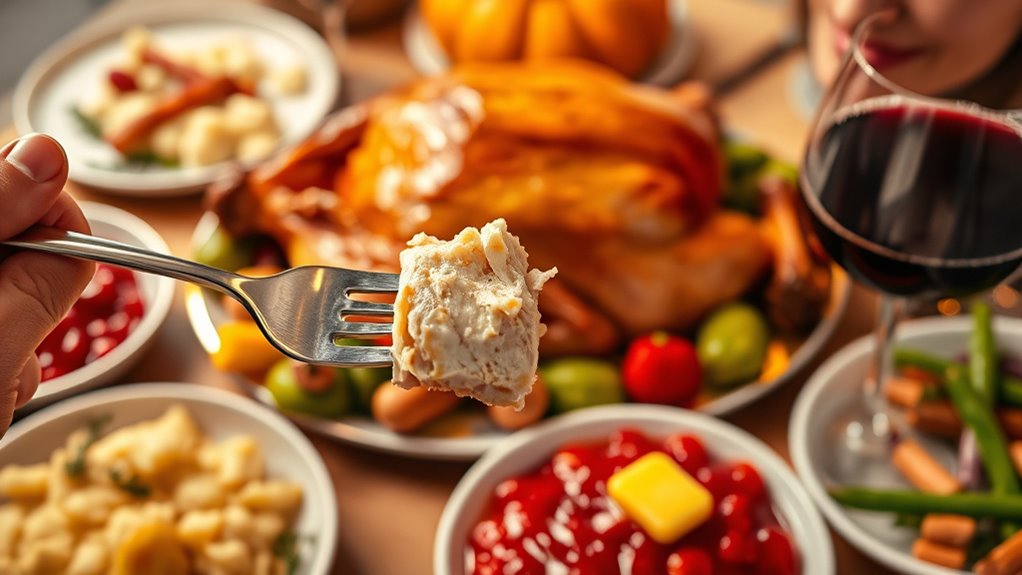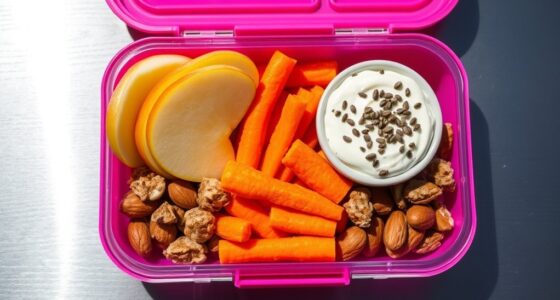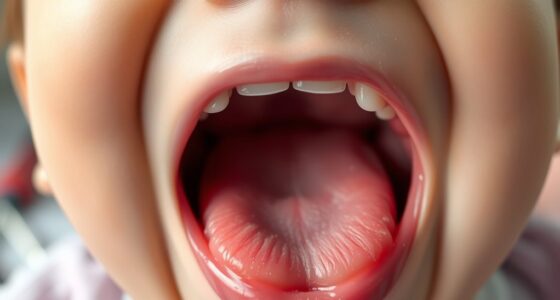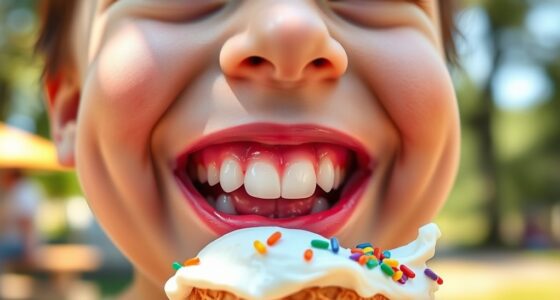During Thanksgiving, protect your teeth by enjoying desserts and sticky foods in moderation, and rinse or brush afterward to remove sugar and plaque. Avoid hard and chewy treats like nuts or caramel that can chip or crack teeth, and steer clear of using your teeth as tools. Practice good oral hygiene, and chew soft foods when possible. Keep these tips in mind to enjoy the feast while keeping your smile healthy—more helpful advice is just ahead.
Key Takeaways
- Limit sugary and sticky foods like cranberry sauce and pumpkin pie to reduce cavity risk.
- Rinse or brush your teeth after indulging in sweets to remove residual sugars and prevent plaque buildup.
- Avoid biting into hard foods such as nuts, caramel, or ice to prevent tooth fractures.
- Use utensils instead of teeth to open packages or cut foods, protecting dental work.
- Maintain regular oral hygiene routines with brushing and flossing after the meal to promote dental health.
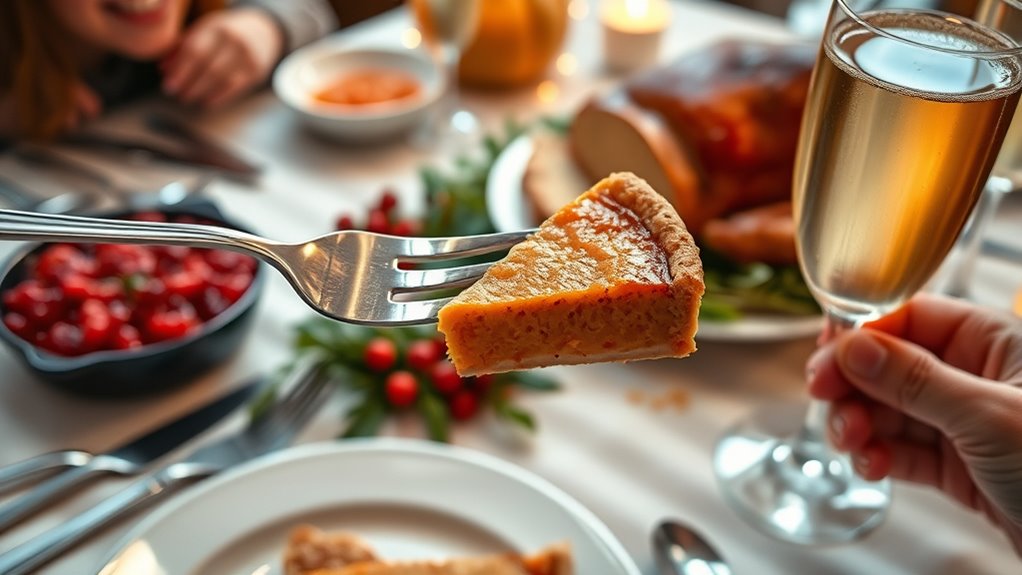
Thanksgiving is a time for delicious foods and festive gatherings, but it can also pose challenges for your dental health. With an abundance of sweet treats and rich dishes, it’s easy to overlook how your choices could impact your teeth. Being mindful about what you eat and how you handle certain foods can help you enjoy the holiday without compromising your dental health. For example, cranberry sauce is a common side, but it can be sticky and laden with sugar, which sticks to your teeth and feeds bacteria that cause decay. Instead of scooping up large spoonfuls, try to limit your intake or rinse your mouth afterward to reduce sugar’s contact with your teeth.
Pumpkin pie, another holiday favorite, is often loaded with sugar, which can contribute to cavities if consumed excessively. Sipping coffee or tea with your pie can also stain your teeth over time. To protect your smile, avoid constantly snacking on sweet desserts and instead, indulge in small portions. After enjoying pumpkin pie, brush your teeth if possible, or rinse your mouth thoroughly to wash away residual sugar and prevent plaque buildup. Remember, the key isn’t to avoid these treats altogether but to enjoy them wisely and in moderation.
During the feast, be cautious about biting into hard foods like nuts or caramel candies that might be present. These can chip or crack teeth if you’re not careful. Chewing on ice is another common mistake, but it’s risky since it can weaken tooth enamel and cause fractures. If you’re tempted to crunch ice or hard candies, think twice and opt for softer options or simply enjoy the flavors without risking damage. Also, avoid using your teeth as tools to open packages or cut things, as this can strain or damage your dental work.
Lastly, don’t forget to maintain good oral hygiene habits. While it might be tempting to skip brushing after a big meal, it’s essential to remove food particles and plaque. Rinse your mouth with water if brushing isn’t immediately possible, and try to schedule a thorough brushing and flossing session later. Drinking plenty of water throughout the day helps wash away sugars and acids, protecting your teeth from decay. Using a HEPA filter air purifier in your home can help reduce airborne allergens and improve your overall respiratory health, which is beneficial especially during holiday gatherings. By making smart choices and practicing good dental habits, you can enjoy the festive flavors of Thanksgiving while keeping your smile healthy and bright.
Frequently Asked Questions
Can I Eat Turkey if I Have Sensitive Teeth?
Yes, you can eat turkey if you have sensitive teeth, but take precautions. Opt for moist, tender pieces to avoid aggravating your sensitivity. Avoid very hot or cold turkey, which can trigger discomfort. Be mindful of sugar intake and cranberry stain, and try not to gum chew too aggressively. Following Thanksgiving Dinner Dental Do’s and Don’ts helps protect your teeth, so enjoy your meal without worry.
Should I Brush Immediately After Eating Sugary Desserts?
You shouldn’t brush immediately after eating sugary desserts because sugar absorption can weaken your tooth enamel, making it more prone to erosion. Brushing right away can actually damage the enamel when it’s temporarily softened by acids from sugar. Instead, rinse your mouth with water or wait about 30 minutes to allow saliva to neutralize acids and re-harden your enamel before brushing. This helps protect your teeth from erosion and decay.
Are There Dental-Safe Alternatives for Traditional Thanksgiving Sweets?
Yes, you can enjoy dental-safe alternatives like fruit-based desserts or sugar substitutes. Opt for fresh fruit salads or baked apples instead of sugary pies and candies, which are gentler on your teeth. Using natural sweeteners like stevia or erythritol can satisfy your sweet tooth without increasing cavity risk. These choices help protect your enamel while still allowing you to indulge in festive treats.
How Can I Prevent Staining From Cranberry Sauce?
To prevent cranberry stain and avoid staining from cranberry sauce, you should rinse your mouth with water immediately after eating. Using a straw can help minimize contact with your teeth. Maintain good oral hygiene by brushing and flossing regularly, especially after the meal. Consider using whitening toothpaste to strengthen your enamel against stains. These stain prevention tips help keep your smile bright during the festive season.
Is It Okay to Chew Gum After the Meal?
Yes, chewing gum after the meal can be good for your oral health. It stimulates saliva production, which helps wash away food particles and neutralize acids that cause tooth decay. Just make sure to choose sugar-free gum to avoid feeding bacteria in your mouth. Chewing gum for about 20 minutes after eating can help keep your teeth clean and freshen your breath, supporting overall oral health.
Conclusion
By following these dental do’s and don’ts, you’ll enjoy your Thanksgiving feast without any dental mishaps. Think of your teeth as delicate ornaments on a tree—you want to keep them shining bright and intact. So, savor your favorite dishes, but remember to brush and floss afterward. With a little care, your smile will stay as radiant as the autumn leaves, ready to greet everyone at the table and beyond.
